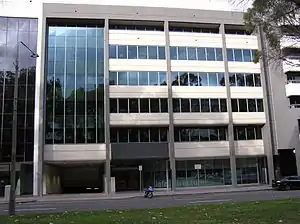 The building at 62 Northbourne Avenue in Canberra, which housed part of the department. | |
| Department overview | |
|---|---|
| Formed | 20 December 2017 |
| Preceding Department | |
| Dissolved | 29 May 2019 |
| Superseding agency | |
| Jurisdiction | Commonwealth Government |
| Ministers responsible | |
| Department executive |
|
The Department of Infrastructure, Transport, Regional Development and Cities was an Australian Public Service department of the Government of Australia that existed between December 2017 and May 2019, charged with the responsibility for infrastructure and major projects, transport, local government, external territories administration, rural and regional development, population policy, and cities.
When created on 20 December 2017, the department replaced the Department of Infrastructure and Regional Development. It was dissolved and remade as the Department of Infrastructure, Transport, Cities and Regional Development by Administrative Arrangements Orders made on 29 May 2019.[1]
Location
The department was headquartered in the Canberra central business district at Infrastructure House and the neighbouring building to Infrastructure House.[2]
Operational activities
In an Administrative Arrangements Order made on 20 December 2017, the functions of the department were broadly classified into the following matters:[3][4]
- Infrastructure planning and co-ordination
- Transport safety, including investigations
- Land transport
- Civil aviation and airports
- Maritime transport including shipping
- Major projects office, including facilitation and implementation of all non-Defence development projects
- Administration of the Jervis Bay Territory, the Territory of Cocos (Keeling) Islands, the Territory of Christmas Island, the Coral Sea Islands Territory, the Territory of Ashmore and Cartier Islands, and of Commonwealth responsibilities on Norfolk Island
- Constitutional development of the Northern Territory
- Constitutional development of the Australian Capital Territory
- Delivery of regional and territory specific services and programmes
- Planning and land management in the Australian Capital Territory
- Regional development
- Matters relating to local government
- Regional policy and co-ordination
- National policy on cities
- Infrastructure and project financing
- Population policy
Structure and audit of expenditure
The department was administered by a senior executive, comprising the Secretary, Steven Kennedy, and several Deputy Secretaries.[5]: p.19
The department's financial statements were audited by the Australian National Audit Office.
References
- ↑ "Administrative Arrangements Order: Summary of changes" (PDF). Australian Government Department of the Prime Minister and Cabinet. 29 May 2019. Archived from the original (PDF) on 3 April 2020. Retrieved 2 November 2020.
- ↑ Brookfield (2012). "Brookfield Office Properties: Infrastructure House". Brookfield. Retrieved 13 October 2012.
- ↑ AAO Dec 2017
- ↑ "Our role, responsibilities and services". Department of Infrastructure and Regional Development. Commonwealth of Australia. 15 October 2013. Archived from the original on 17 October 2013. Retrieved 17 October 2013.
- ↑ Department of Infrastructure, Regional Development and Cities (October 2018). "Department of Infrastructure, Regional Development and Cities Annual Report 2017-18" (PDF). Department of Infrastructure and Transport. Archived from the original (PDF) on 15 March 2020.